The Michael Bay Transformers movies occupy a unique place in the history of Hollywood filmmaking, existing as a bridge between the more auteur-driven blockbusters of the 1990s and the more franchise-driven programmers of the 2010s. The first five Transformers films exist with one gigantic computer-generated robotic leg in each camp, capturing a snapshot of a moment when the larger industry was in flux.
Michael Bay’s Transformers films are relatively under-discussed in the larger canon of big-budget filmmaking. There are exceptions like Lindsay Ellis’ The Whole Plate, but Bay’s Transformers movies don’t generate nearly as much online chatter as the work of directors like Steven Spielberg and Christopher Nolan or as franchises like the Marvel Cinematic Universe or the DC Extended Universe, despite grossing $4.37B over five movies, ranking them as one of the highest-grossing film series of all time.
Part of this is undoubtedly down to the fact that these five films are all varying degrees of bad. More than that, the films are frequently sexist and racist. There is a strongly jingoistic theme running through the franchise, to the point that it retroactively seems hilarious that Hasbro opted to make Transformers before G.I. Joe because they were worried that G.I. Joe would seem too militaristic for audiences dealing with the real-life context of the Iraq War.
There is perhaps a worry that any earnest discussion of Bay’s Transformers — any attempt to place the films in their unique context — would be misconstrued as a defense of a film franchise that features a gigantic computer-generated robot urinating on Emmy winner and national treasure John Turturro. Still, the release of Transformers: Rise of the Beasts provides a good opportunity to understand what these films were and what they represented.
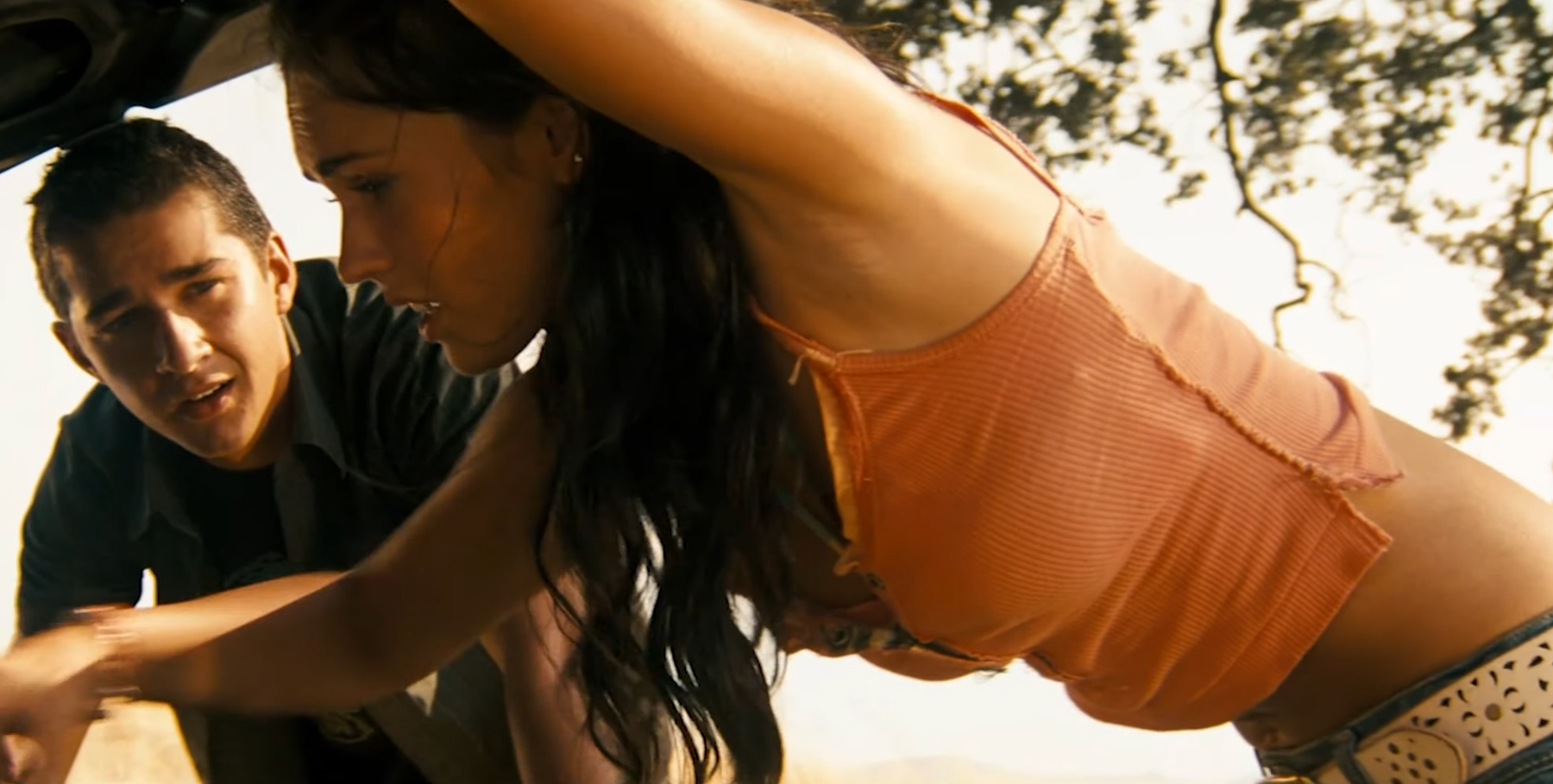
In essence, Michael Bay’s Transformers franchise serves as a bridge between two modes of Hollywood blockbuster filmmaking. It arrives towards the end of the director-driven approach to these big-budget spectacles, while heralding the arrival of a new era where the multimedia intellectual property would be king. Watching the five films released in the decade between 2007 and 2017, one can see a tug of war between Hollywood’s past and its future.
Love him or hate him, Michael Bay is a distinctive filmmaker. However one feels about his maximalist style of movie-making, Bay exists in a class entirely his own. A generation of action filmmakers emerged trying to emulate Bay’s trademark style, but none have pulled it off as effectively as he does. Rise of the Beasts is proof. Its action sequences try to emulate Bay’s trademark “Bayhem” but somehow end up even more cluttered and disjointed.
Bay was among the wave of directors who moved from advertising into movies. David Fincher is perhaps the most acclaimed and highest-profile of this group. Bay worked at the same production company as Fincher and was known as “the little Fincher.” Jake Gyllenhaal has worked with both directors and claims they are the “same.” Megan Fox’s criticisms of Bay as “a tyrant” on set recall Robert Downey Jr.’s description of Fincher as “a disciplinarian.”
However, Bay is best understood in the context of the “vulgar auteurs” like Tony Scott. Both Scott and Bay worked with veteran blockbuster producers Don Simpson and Jerry Bruckheimer. Bay’s style carries across a lot from Scott, particularly his fondness for the palette of oranges and blues that are a frequent feature in advertising. Both directors love a golden sunset. Even the rah-rah militarism of Bay’s Transformers films feels like an extension and escalation of Scott’s work on Top Gun.
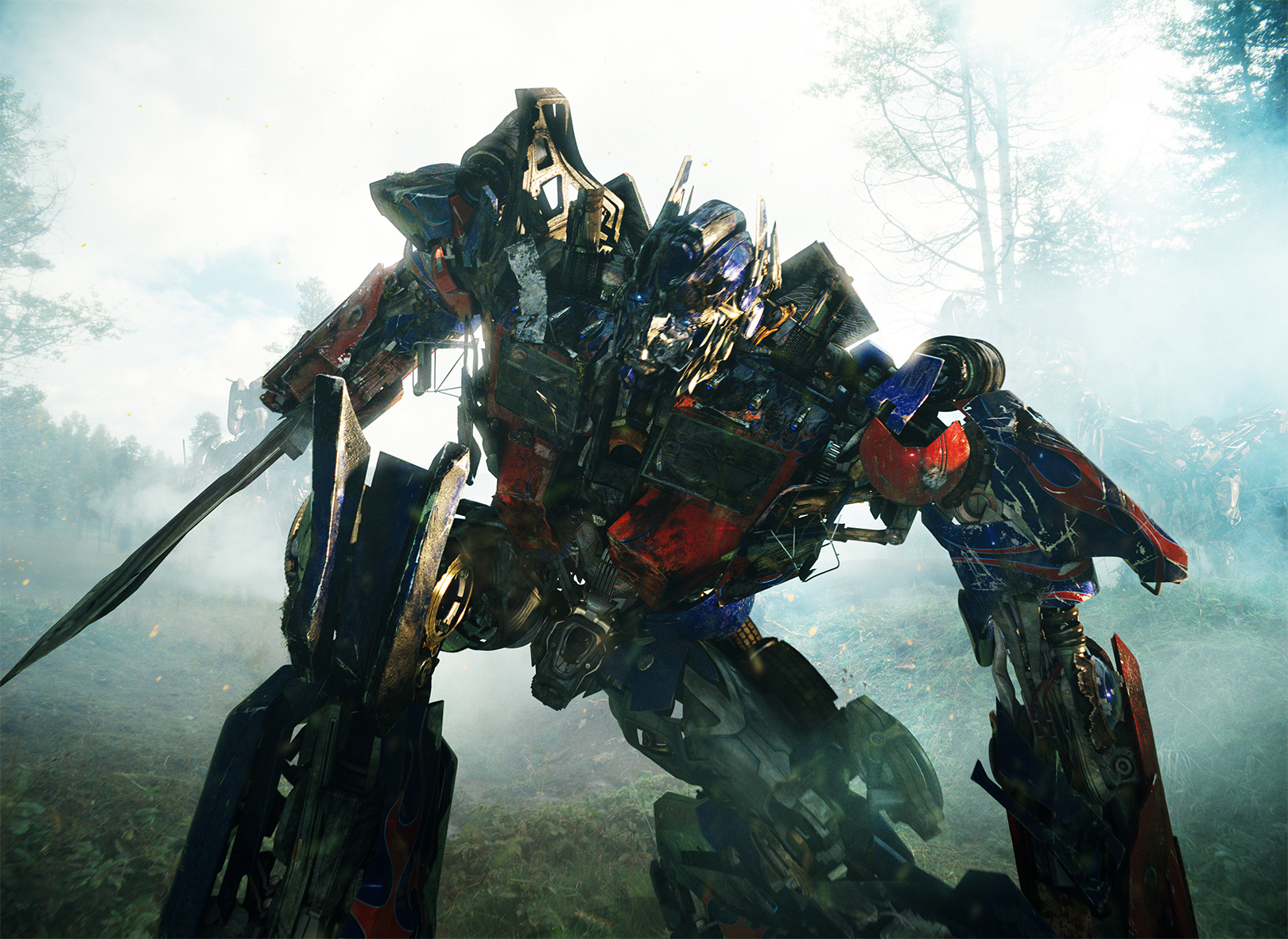
Bay came to prominence during the 1990s with a string of hits: Bad Boys, The Rock, and Armageddon. These existed in the context of other director-led features capitalizing on advances in effects technology, like James Cameron’s Terminator 2: Judgment Day, Steven Spielberg’s Jurassic Park, or Roland Emmerich’s Independence Day. While some were sequels or adaptations, they didn’t operate in the same way that modern franchises do.
After Armageddon, Bay would attempt to transition into a more respectable mode with Pearl Harbor. He even planned to tone down his bombastic visual style in favor of more conventional techniques. This reportedly lasted until about noon on the first day of shooting. In a retrospective oral history, Bay explained himself with as much subtlety as one might expect, “I don’t change my style for anybody. Pussies do that.”
Luckily for Bay, he was working in Hollywood at a time when studios didn’t expect major directors to change their style. The early embrace of comic book adaptations, for example, leaned heavily on directors with strong stylistic sensibilities being asked to apply them to existing properties: Bryan Singer’s X-Men, Sam Raimi’s Spider-Man, Ang Lee’s Hulk, Christopher Nolan’s Batman Begins, Robert Rodriguez and Frank Miller’s Sin City. There was a sense that filmmakers and franchises could coexist.
Transformers was always an odd property, in that it existed as a franchise more than anything else. It wasn’t a narrative or a set of characters. It existed because Ronald Reagan had loosened restrictions on advertising to children, allowing toy companies to produce cartoons that were essentially half-hour-long adverts to promote their merchandise. In some ways, it was a truly vertically integrated franchise in a way that prefigures so much of what these major brands have become.
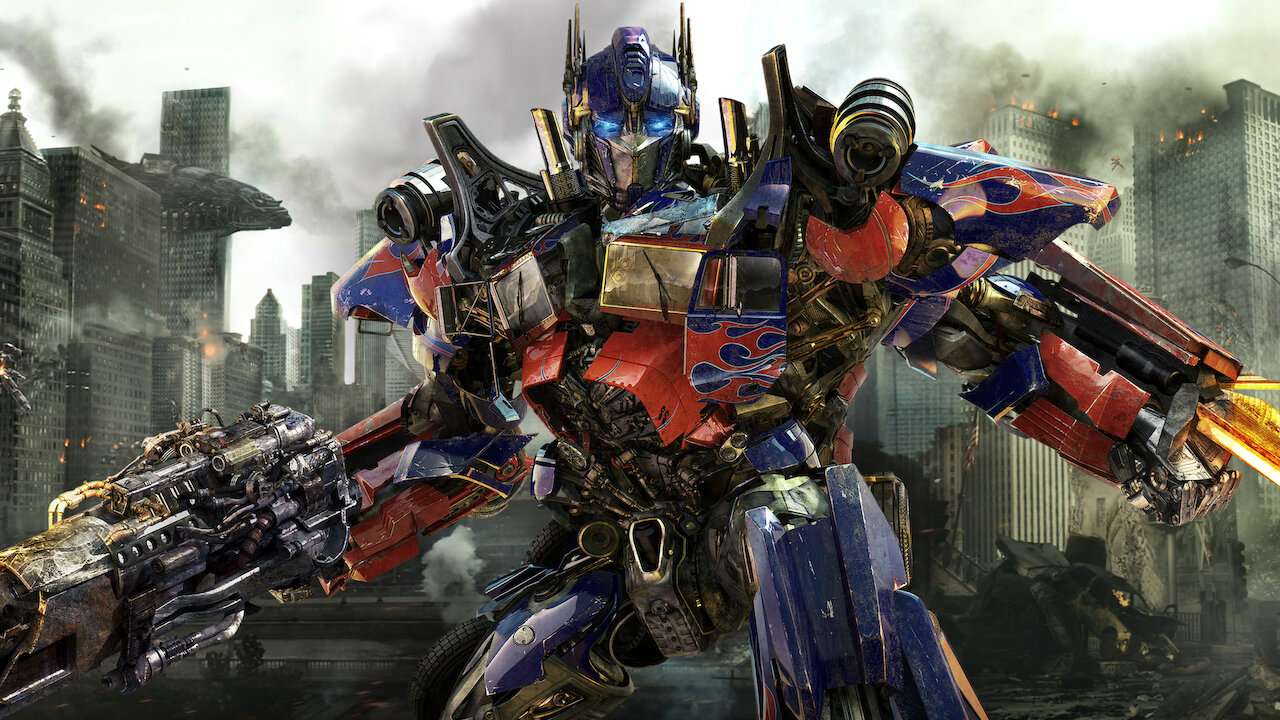
Bay’s Transformers arrived in 2007, the year before Iron Man launched the Marvel Cinematic Universe, which would codify a new way of making these sorts of movies. Transformers is undeniably a Michael Bay movie. It is preoccupied with the director’s interests, with no real interest in the property it was ostensibly adapting. The aesthetic was very much that of a juvenile teenager crashing his little brother’s toys into their father’s Maxim magazine. This is obviously not great. As mentioned above, these movies are not good.
However, Bay’s approach is refreshing in the context of a pop culture that treats Ghostbusters as a sacred text. Bay’s influence only increased with Revenge of the Fallen. The movie’s production was derailed by the writers’ strike, which perhaps liberated Bay from the tyranny of the script. Bay wrote 60 pages of the script himself. Revenge of the Fallen is somehow even truer to Bay’s sensibility than Transformers.
Roger Ebert famously argued that cinema was “an empathy machine,” a window that invites the audience to see the world through another’s eyes. This is perhaps particularly true of bad movies; to watch Tommy Wiseau’s The Room or James Nguyen’s Birdemic is to step inside the head of a complete stranger who seems to have a very different understanding of reality than most human beings. It’s an experience that an algorithm or a focus group can never truly replicate.
Of course, Hollywood was shifting. Bay’s early Transformers films overlapped with the last wave of the more prominent directors being given complete control over their franchises. Transformers came out the same year as Sam Raimi’s Spider-Man 3, and Dark of the Moon came out a year before Christopher Nolan’s The Dark Knight Rises. As Marvel became more powerful, it would engage in high-profile conflicts with directors like Jon Favreau, Joss Whedon, Patty Jenkins, and Edgar Wright.
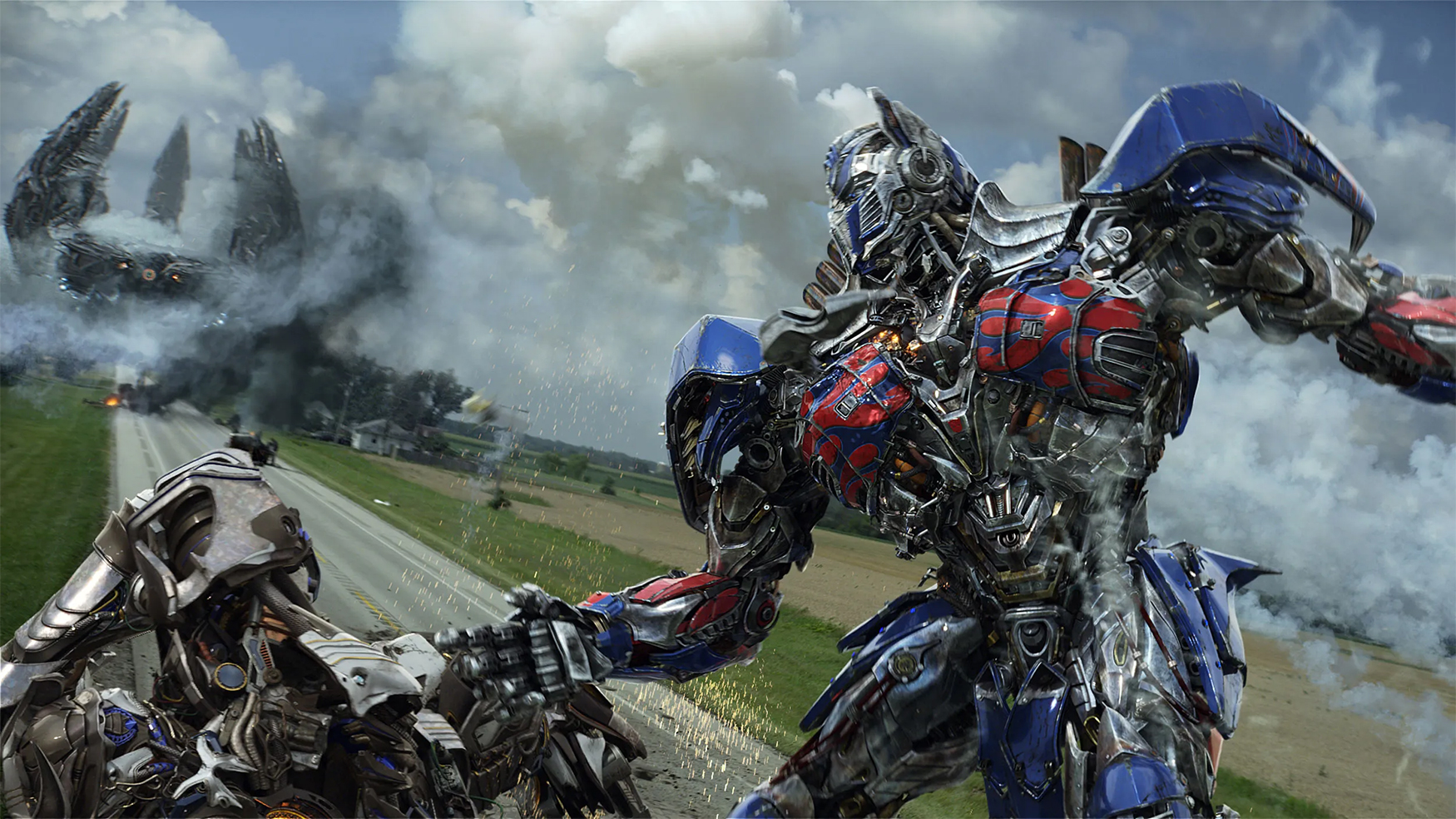
In the later Bay Transformers films, this tension becomes part of the text. In the third film, Dark of the Moon, franchise hero Sam Witwicky (Shia LaBeouf) continuously claims that he is never afforded any respect despite having saved the planet twice. It’s interesting to wonder if Bay might have empathized, having made two massively successful blockbusters in his own unique style that were critically derided and often treated as pop cultural punchlines.
This conflict is central to the fourth film, Age of Extinction, the only film of the set to engage with the idea of Transformers as intellectual property, as a mass-market product. Billionaire Joshua Joyce (Stanley Tucci) plans to financially exploit the Transformers, harvesting their parts to make cheap consumer products. He builds a “consumer-friendly” “upgrade” to the property, including knockoffs of Bumblebee and Optimus Prime (Peter Cullen).
It’s no small irony that Age of Extinction is the only Transformers film engaged in a discussion about the consumerist impulses that motivate the larger property and the Transformers film with the most egregious product placement. Still, there is a sense that Bay is asserting ownership of the franchise. These are his films, however scruffy and vulgar they might be, no matter how hard others might want a more generic and less distinctive take on the property.
As such, there’s something elegiac about Bay’s fifth and final Transformers film, The Last Knight. It was released in 2017, at a time when these major franchises seemed more hostile to this sort of director-led approach than ever before. Joss Whedon would replace Zack Snyder on Justice League. Phil Lord and Chris Miller parted ways with Lucasfilm over Solo: A Star Wars Story. Rian Johnson’s efforts to put a unique stamp on The Last Jedi would provoke a bizarre culture war over the property.
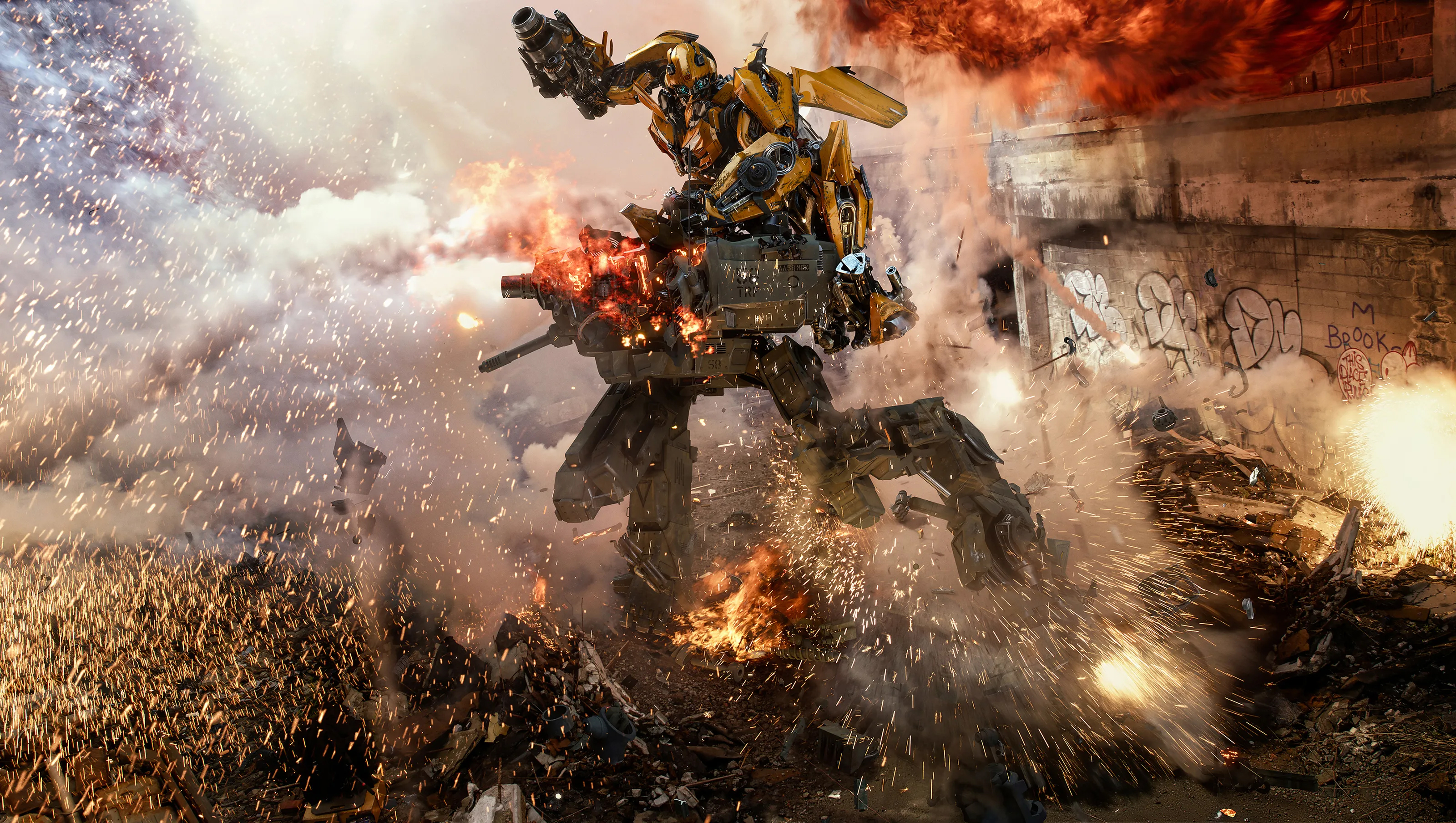
The Last Knight feels like the end of an era. The Autobots are no longer soldiers fighting a forever war, but refugees being hunted down. Cade Yeager (Mark Wahlberg) lives in a junkyard. Viviane Wembly (Laura Haddock) is the last descendant of Merlin (Tucci, again), ending that bloodline and mourning the death of her father. Optimus visits the ruins of the long-dead Cybertron. It is revealed that Earth exists atop the corpse of the “vile god” Unicron. It’s weirdly funereal.
For the first time, Bay’s sunsets feel thematically motivated. Children play in ruins and hide behind wire fences. Much of the plot is motivated by Sir Edmund Burton (Anthony Hopkins), an old man who lives alone in a castle with his camp robot butler (Jim Carter) and who is the last surviving member of the ancient order of the “Witwiccans.” It’s about as mournful as a Michael Bay movie can be. Even if it hadn’t underperformed, there is a sense that this marks the end of the line for Bay’s involvement.
Spanning that decade from 2007 to 2017, Bay’s Transformers movies stretch across a Hollywood in transition from one mode of blockbuster filmmaking to another. They may represent the last time that a director with that distinct a style was granted that much power over that large a nostalgia property for such an extended period. They’re not great films. They aren’t even good films, but they are strangely important films.

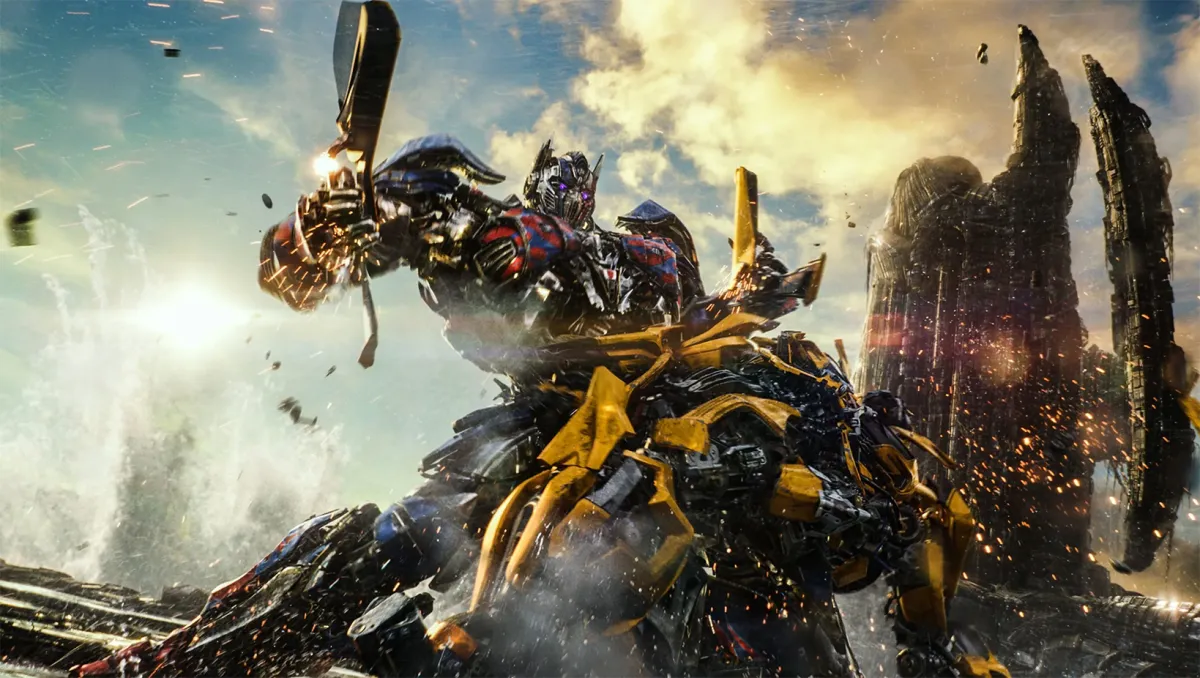




Published: Jun 10, 2023 11:00 am